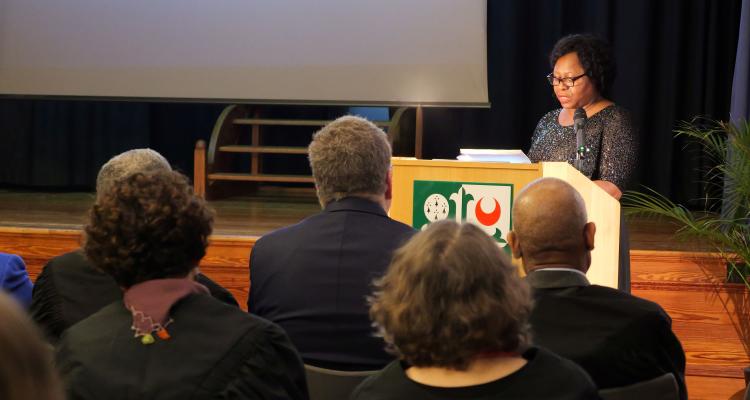The Founders’ Memorial Lecture was established over 90 years ago with an anonymous donation that is now recognised as the gift of alumna Amy Lilian Lawrence, b. 1872. Amy studied Natural Sciences at Girton from 1891: her gift of £500 in 1927 endowed the Founders' Memorial Lecture, and after her death in 1934 her family and friends established the Lawrence Room Museum for works of art and antiquity.
A true Girton all-rounder, Amy grew up with a sense of public spirit and devotion to duty. She did not regard herself as a distinguished scholar or great teacher, but she was known for her ‘irrepressible gaiety’, love of music, and interests in arts and crafts. She was also a gardener, often donating plants to the College. The lectures she inspired are effectively a tribute to those mid-Victorian women and men whose hard work, ‘indomitable perseverance’, brilliance and imagination brought this College to life.
The Founders’ Memorial Lecture series was introduced by Lady Stephen on March 3, 1928, as one which would ‘be prolonged to infinity’ – it would be a ‘memorial window’ to ‘bring in the light’. The inaugural lecture was delivered by Nobel Laureate, Sir Joseph John Thompson FRS, physicist and Master of Trinity College, who combined ‘personal and official distinction’ to ‘a pre-eminent degree’. The title was ‘Beyond the Electron’ reflecting Thompson’s pathbreaking role in the then-emergent field of atomic physics. This first presentation was, like the series as a whole, designed to be accessible to non-specialists. A description of it in ‘Nature’ reads: ‘in the art of making the deep things of physics plain, not merely to the professional scientific worker but also to the educated world at large, Sir J. J. Thomson has few equals’. The lecture was reported in the Times and the Telegraph, and re-published in 2018 by Cambridge University Press; the original is available in the College Library.
The next eight lecturers were also men, several with a link, one way or another, to Trinity College – the standard by which Emily Davies once benchmarked her College. They include four distinguished scientists (biologist and classicist, Professor Sir D’Arcy Wentworth Thompson; astronomer, physicist and populariser of science Sir Arthur Eddington; pharmacologist, physiologist, and Nobel Laureate, Sir Henry Hallett Dale; and experimental physicist and Nobel Laureate Patrick Maynard Stuart (Baron) Blackett). The non-scientists among this early group include the philosopher C. D. (Charlie Dunbar) Broad, art historians Fritz Saxl and Sir Kenneth Mackenzie (Baron) Cark, and moral philosopher Alexander Dunlop (Baron) Lindsay, whose lecture ‘The Good and the Clever’ is the only one from this period still held in the College Library.
By 1948, the Foundational aim of degrees for women having been met, the intellectual distinction of the College and its flagship lecture series firmly established, a more diverse pattern of Lecturers emerged. That year saw the first woman presenter, Theodora Bosanquet. Feminist and suffragette, writer, reviewer, editor and amanuensis to Henry James, she worked closely with her partner of 25 years, Lady Margaret Rhondda, on the magazine Time and Tide, and was secretary to the International Federation of University Women. Her lecture was on ‘The Return of Henry James’.
Two years later the Founders' Memorial Lecture was delivered by one of the most influential figures in the history of ballet, Dame Ninette de Vallois, on ‘The English Ballet’. Then, in 1956, Girton’s own Helen Cam spoke on ‘Law as it appears to the Historian’, the text of which is held in the College library. Helen Cam was a medieval historian; she formed an important link between Girton and those ‘Seven Sisters’ Colleges that were similarly founded for women in the USA. The decade was drawn to a close by another medievalist, Professor Eleanor Shipley Duckett who mainly lived in the USA with her lifelong companion, the novelist Mary Elle Chase, having held the Ottilie Hancock Research Fellowship at Girton 1926-28.
In the next half-century, 37 lecturers took the stand, with a more-or-less even gender split.
The full lecture list can be viewed here.

